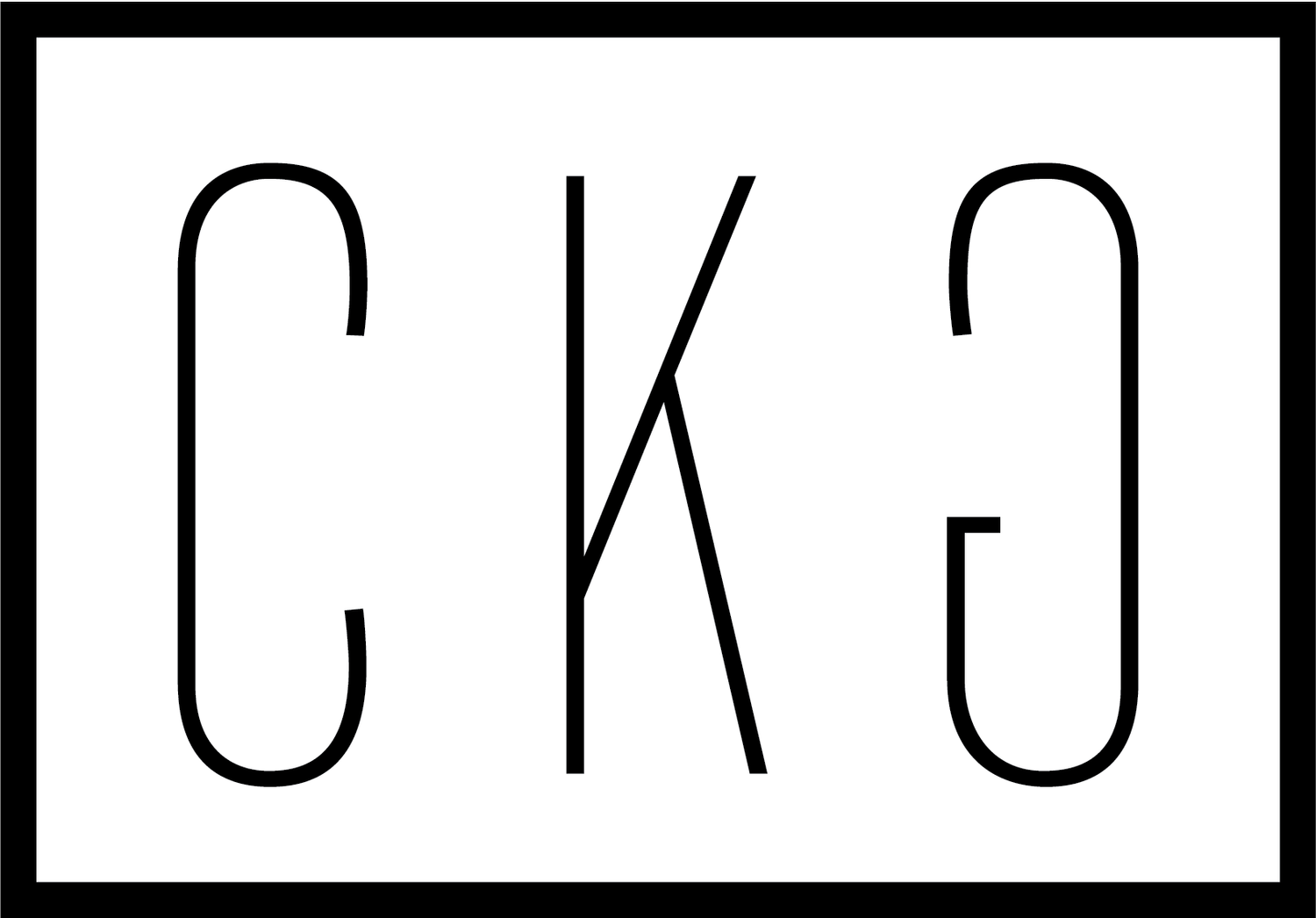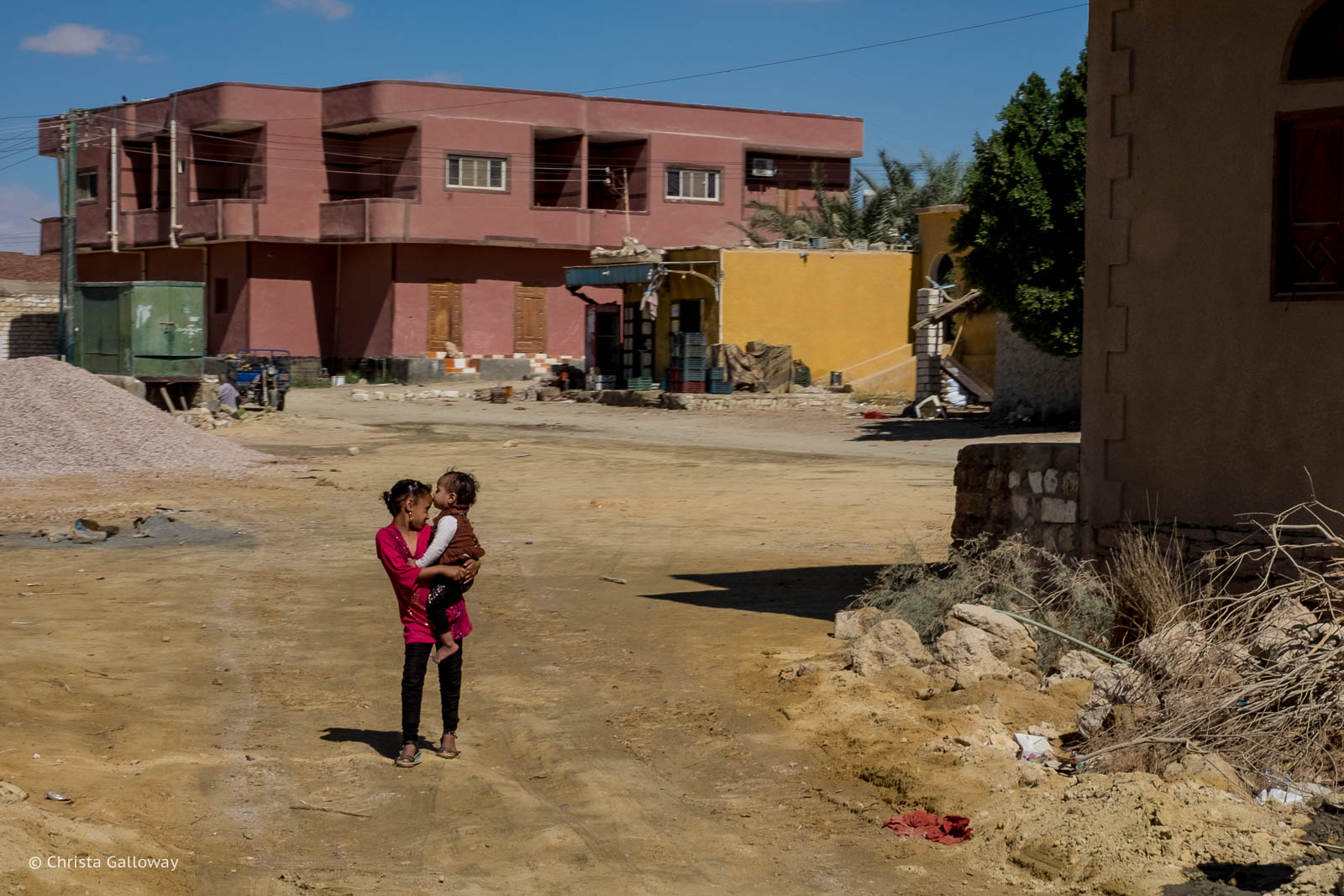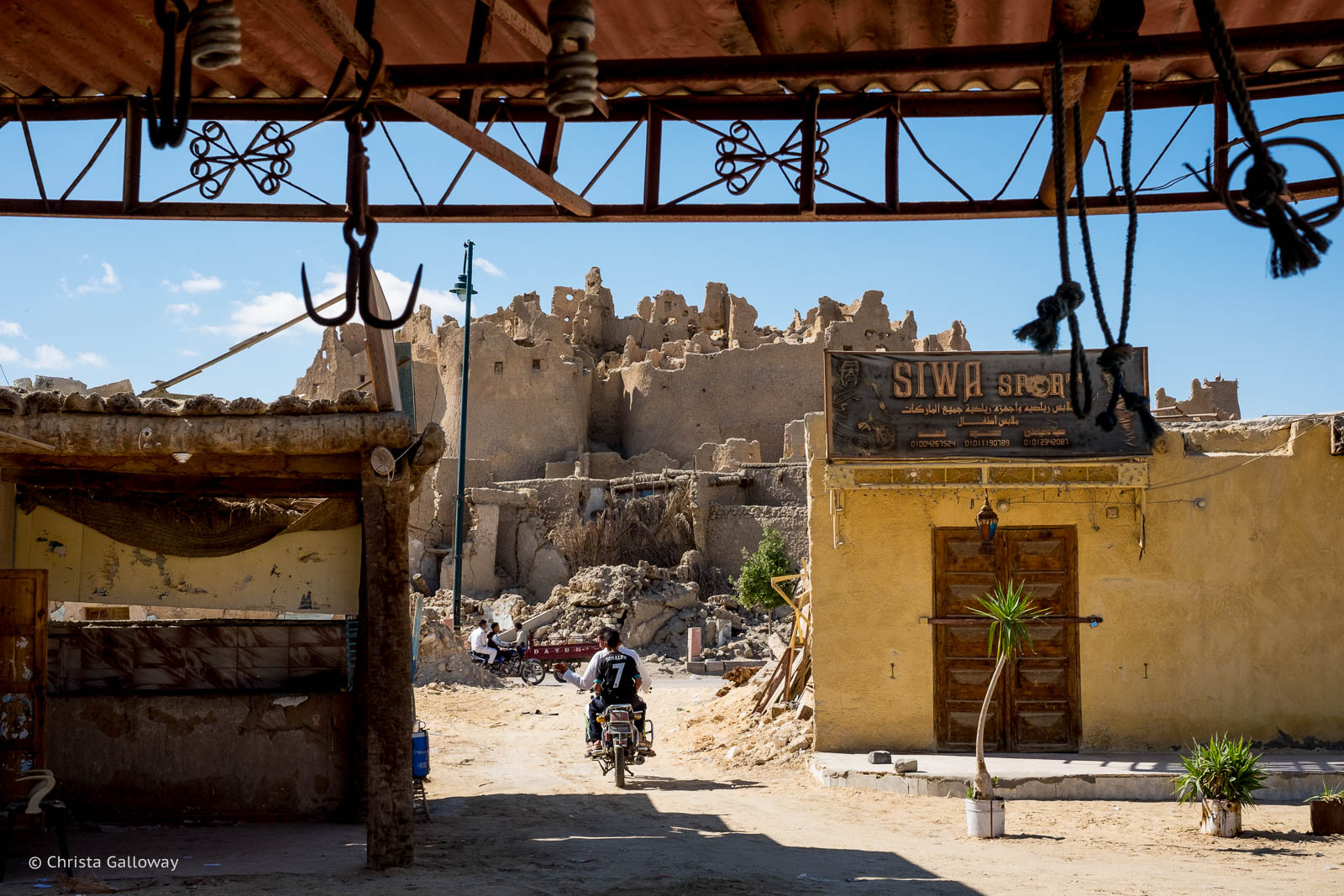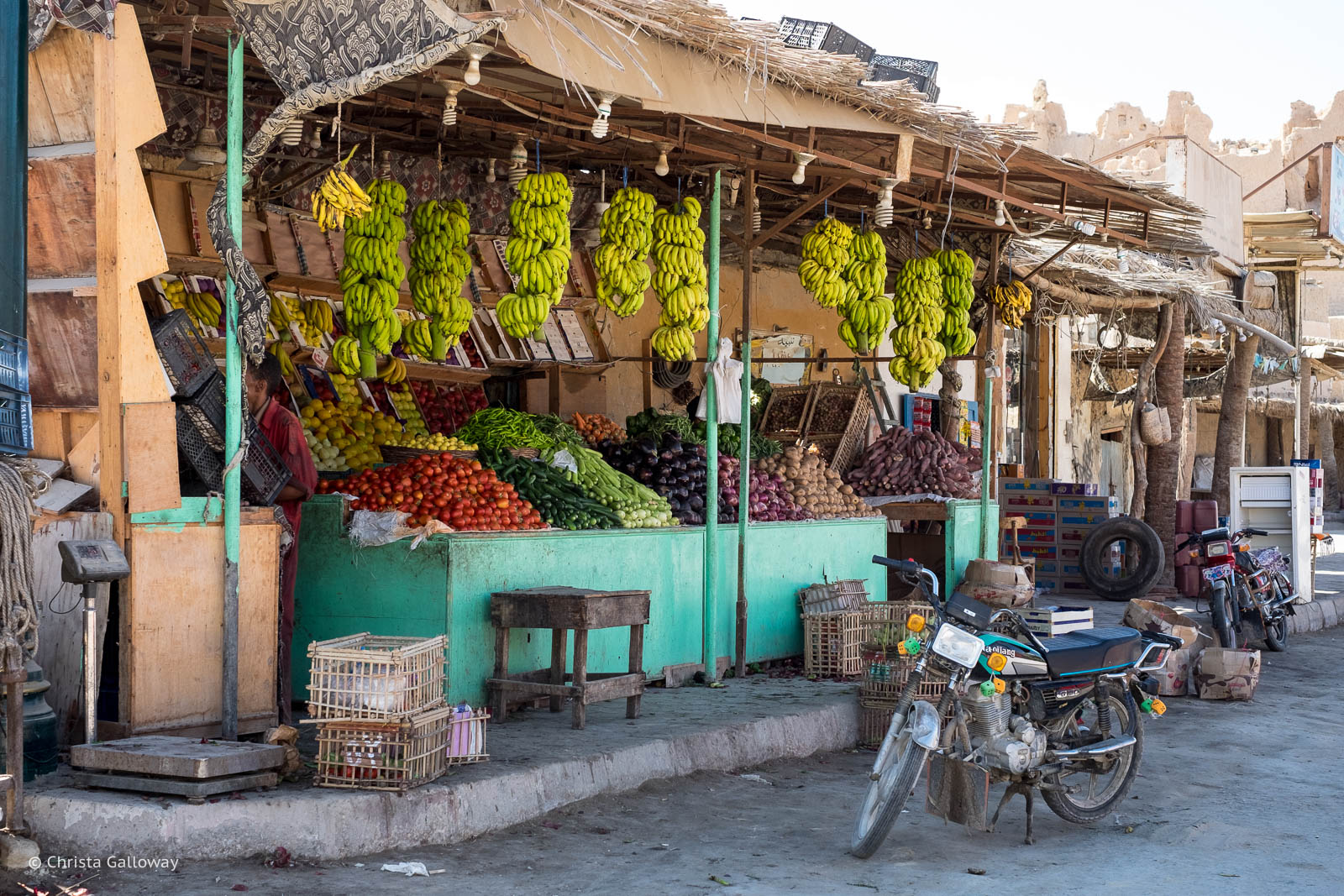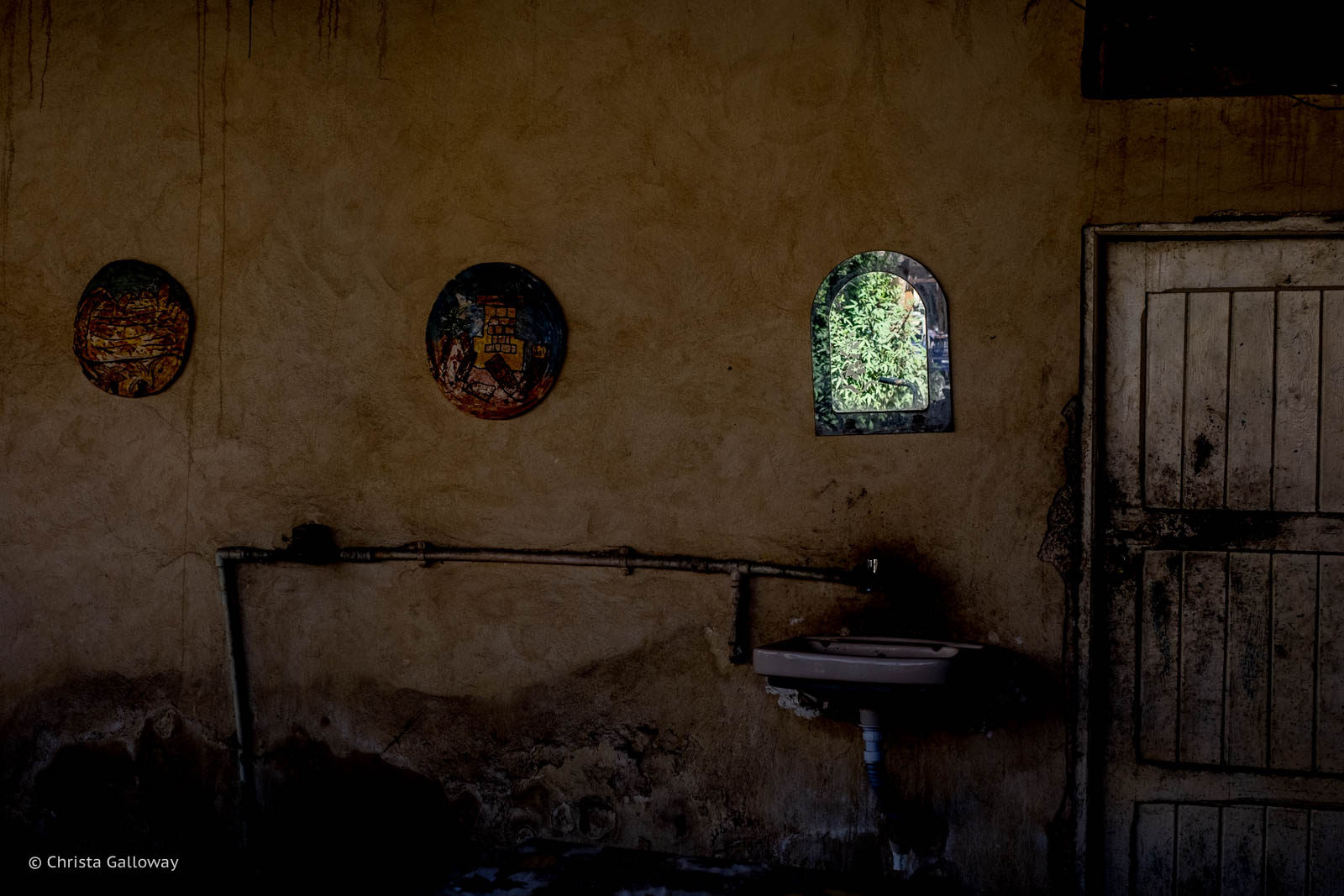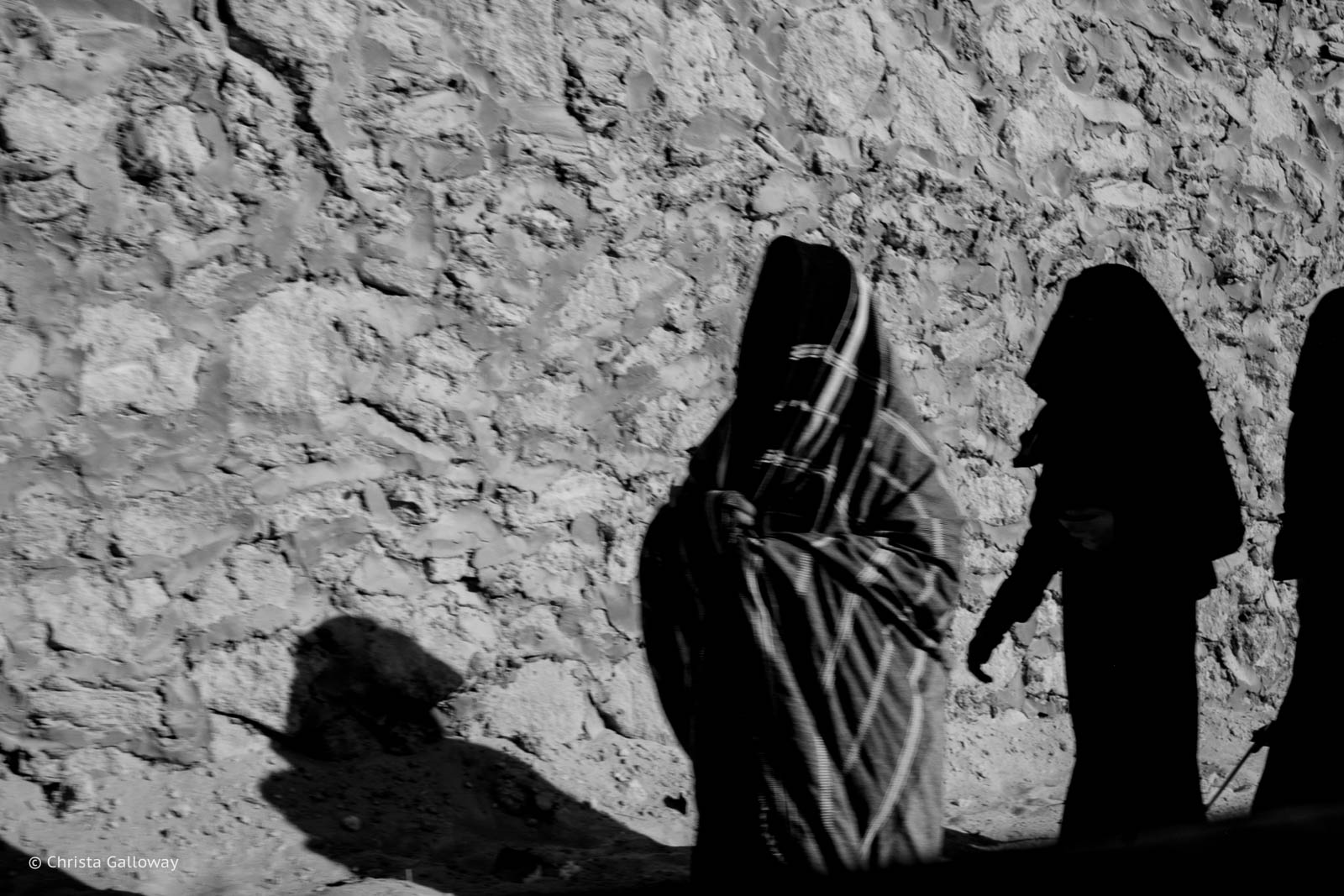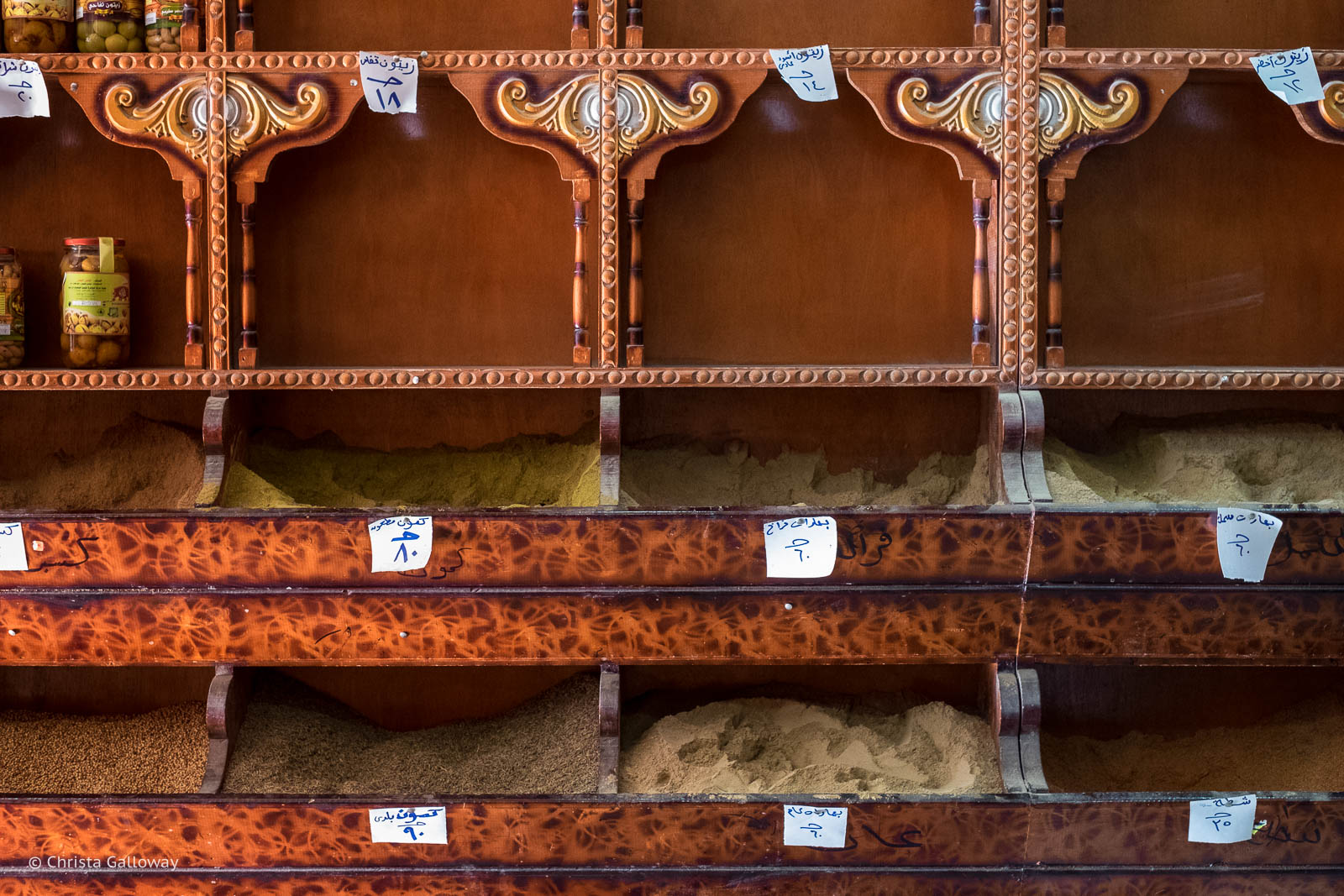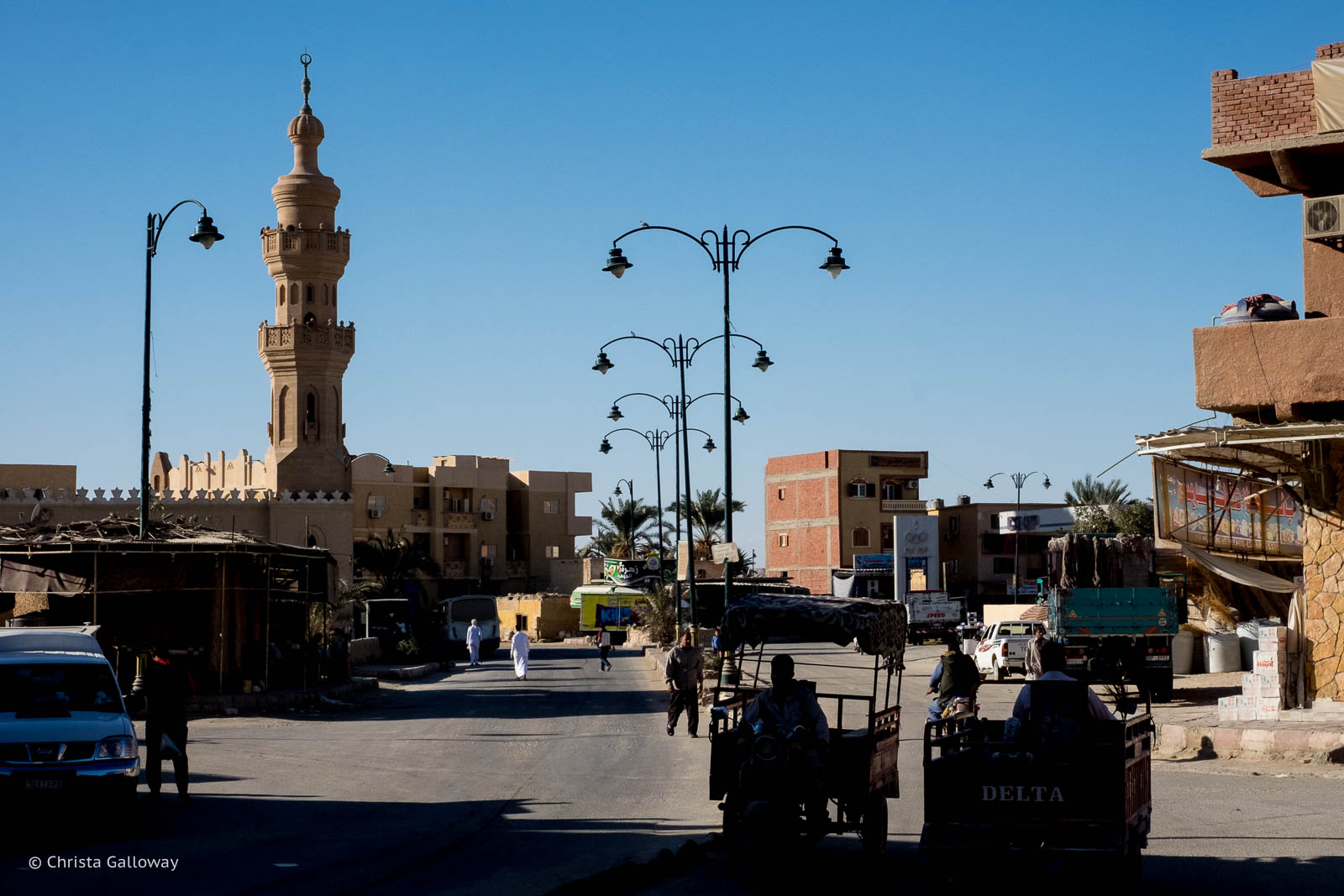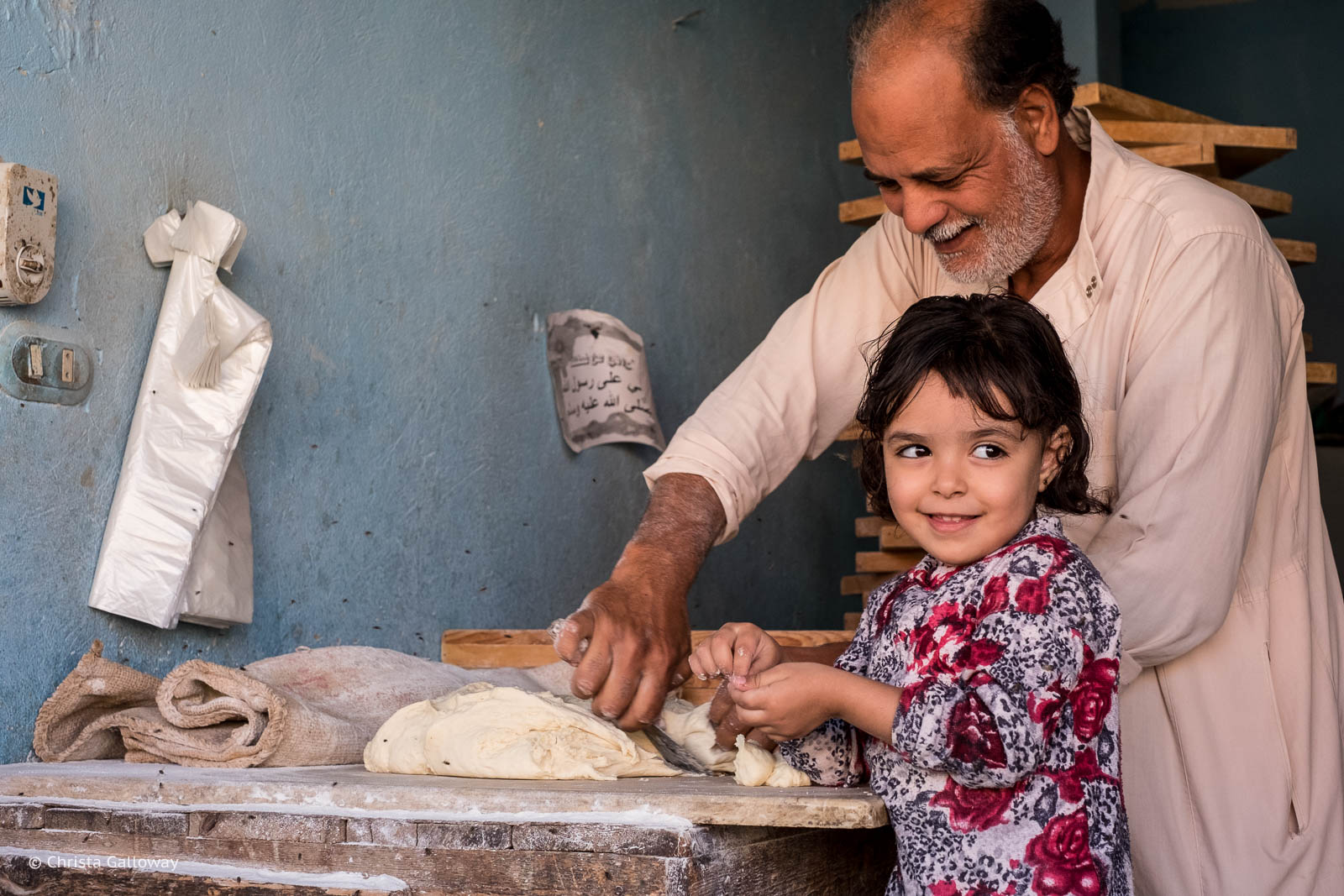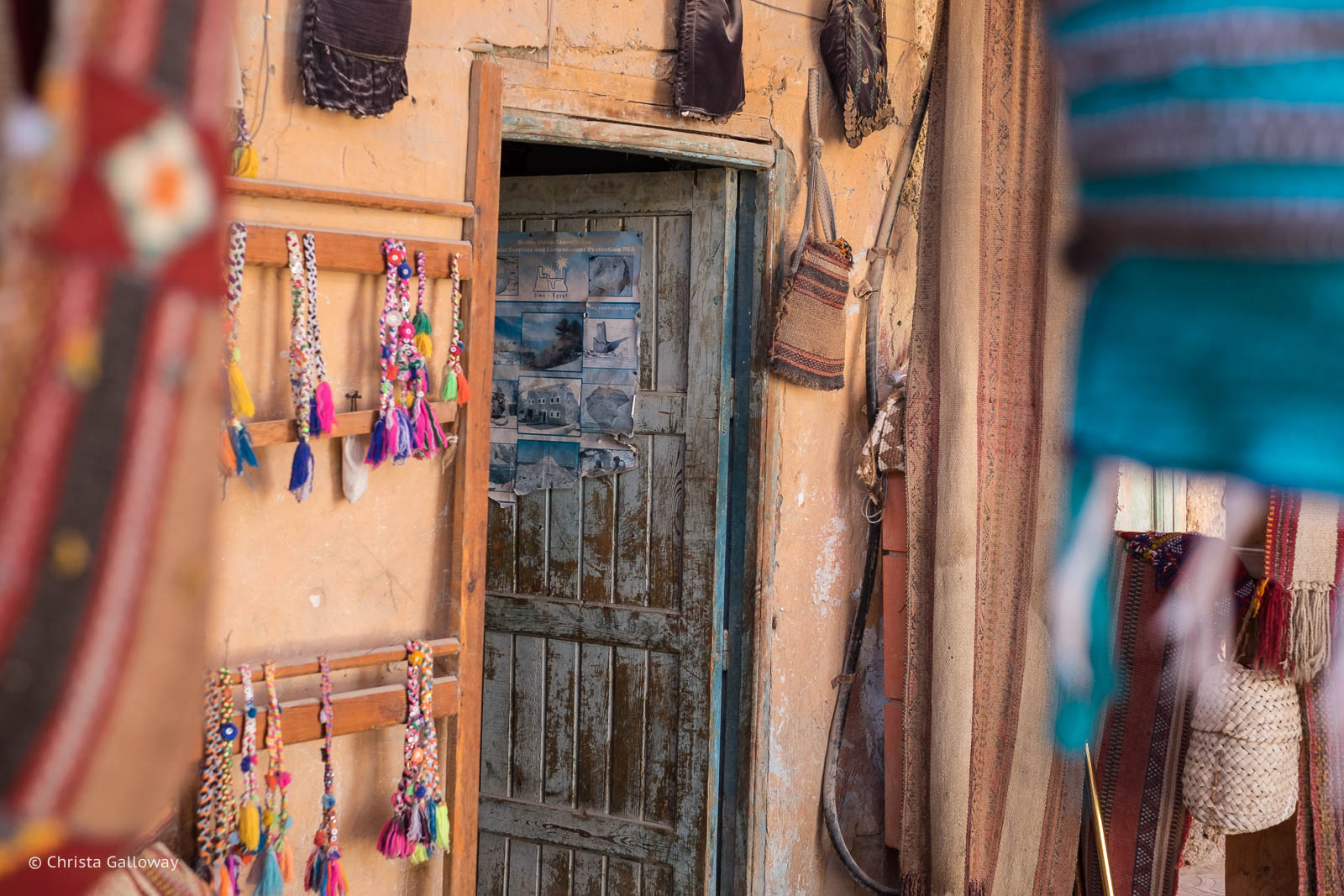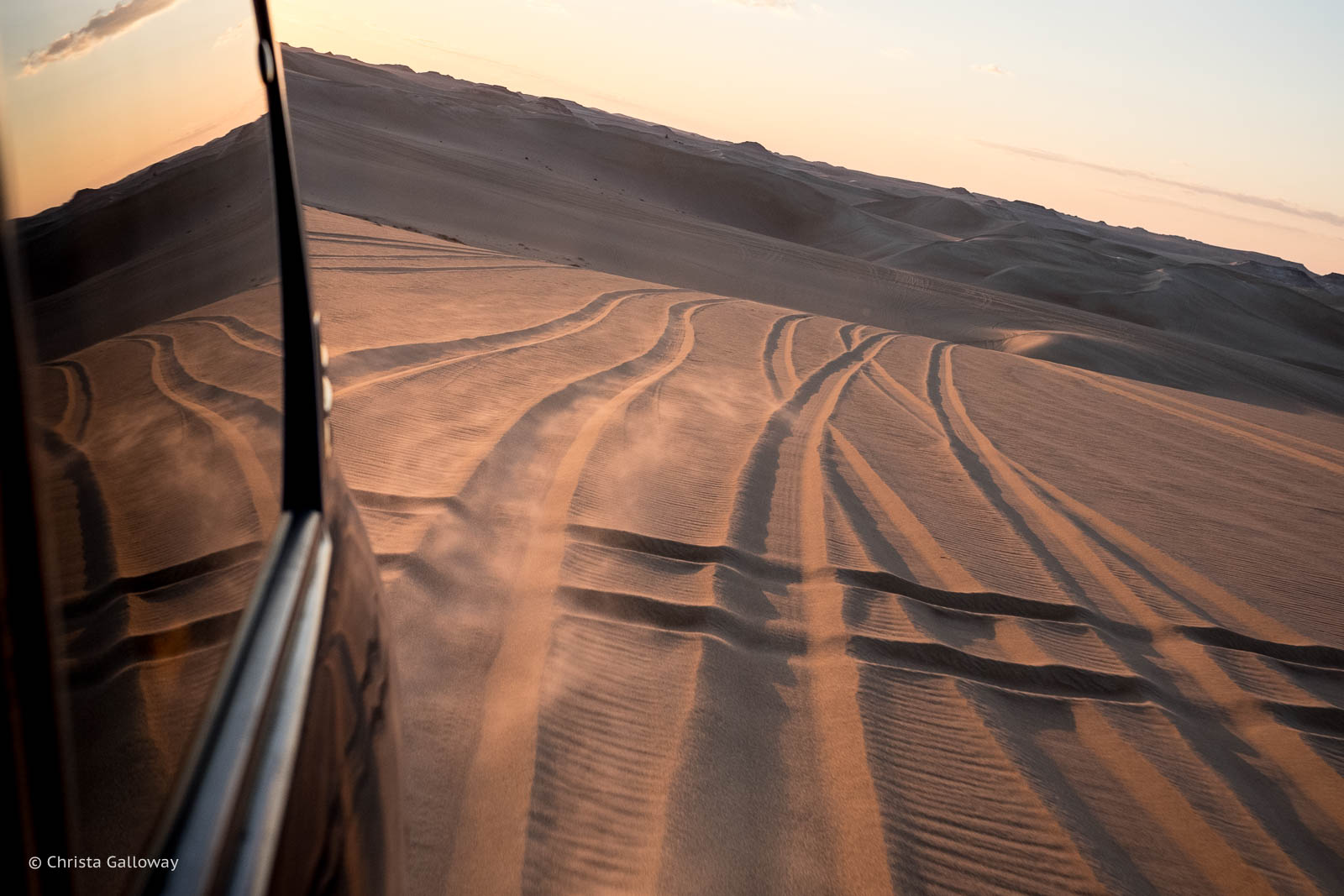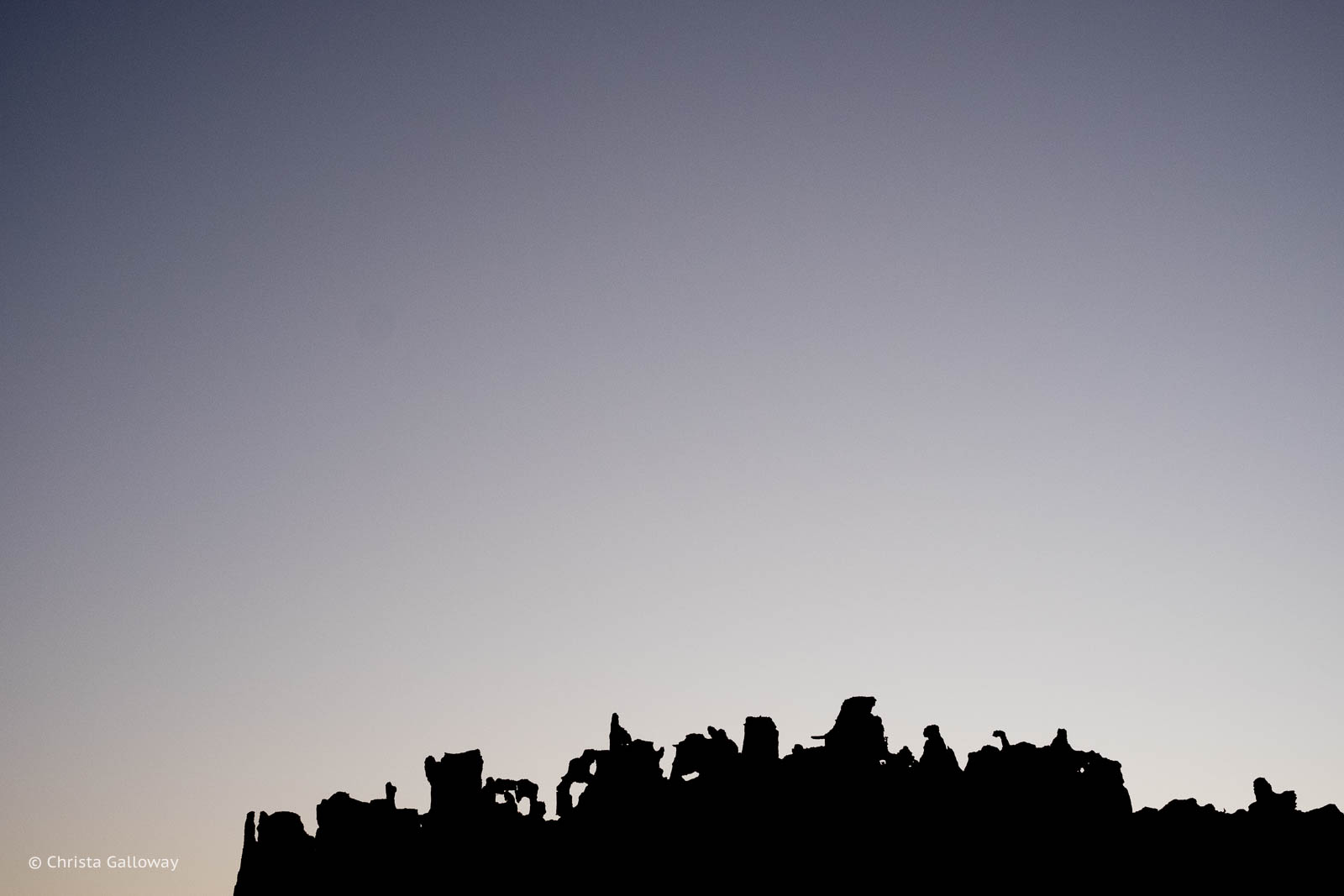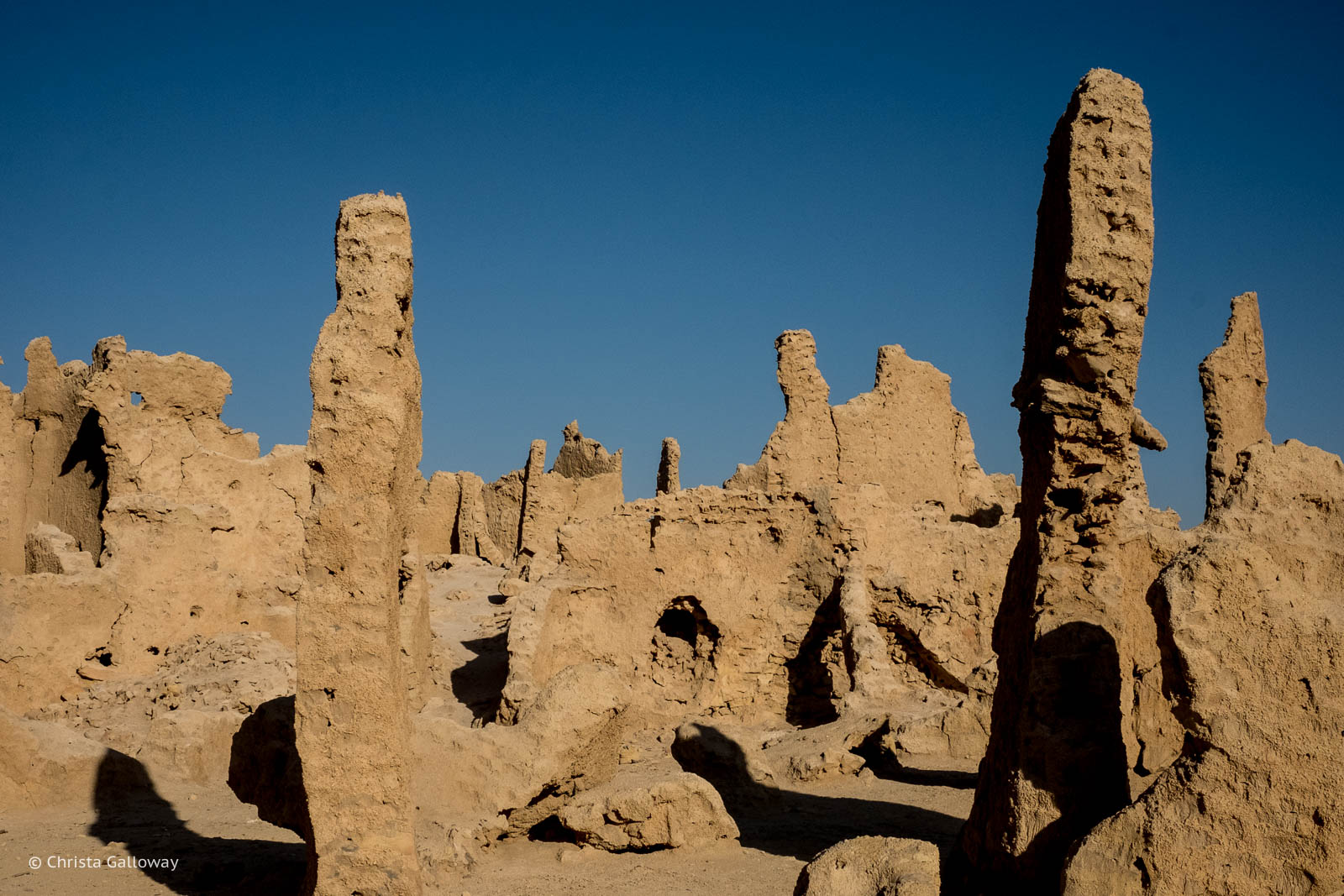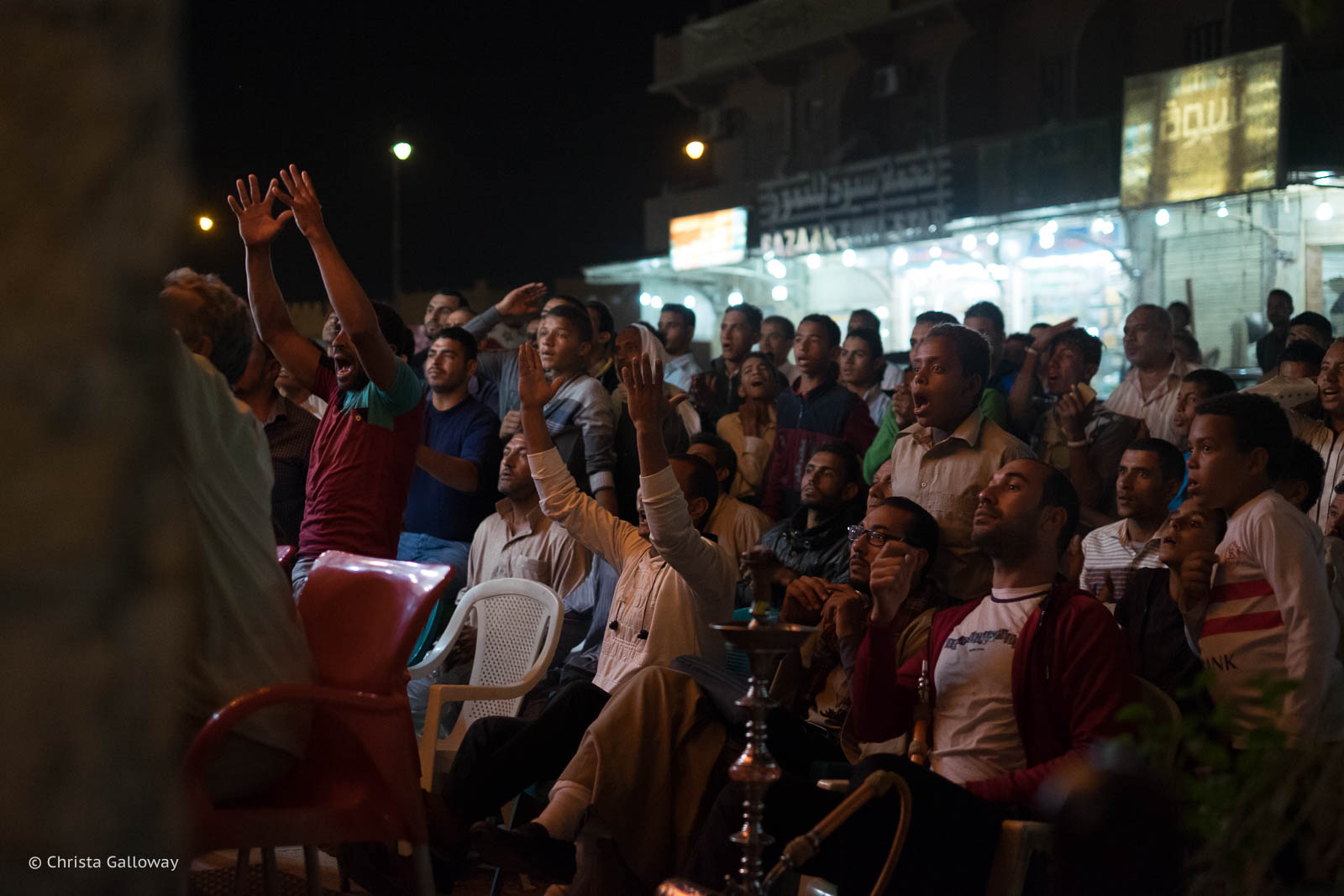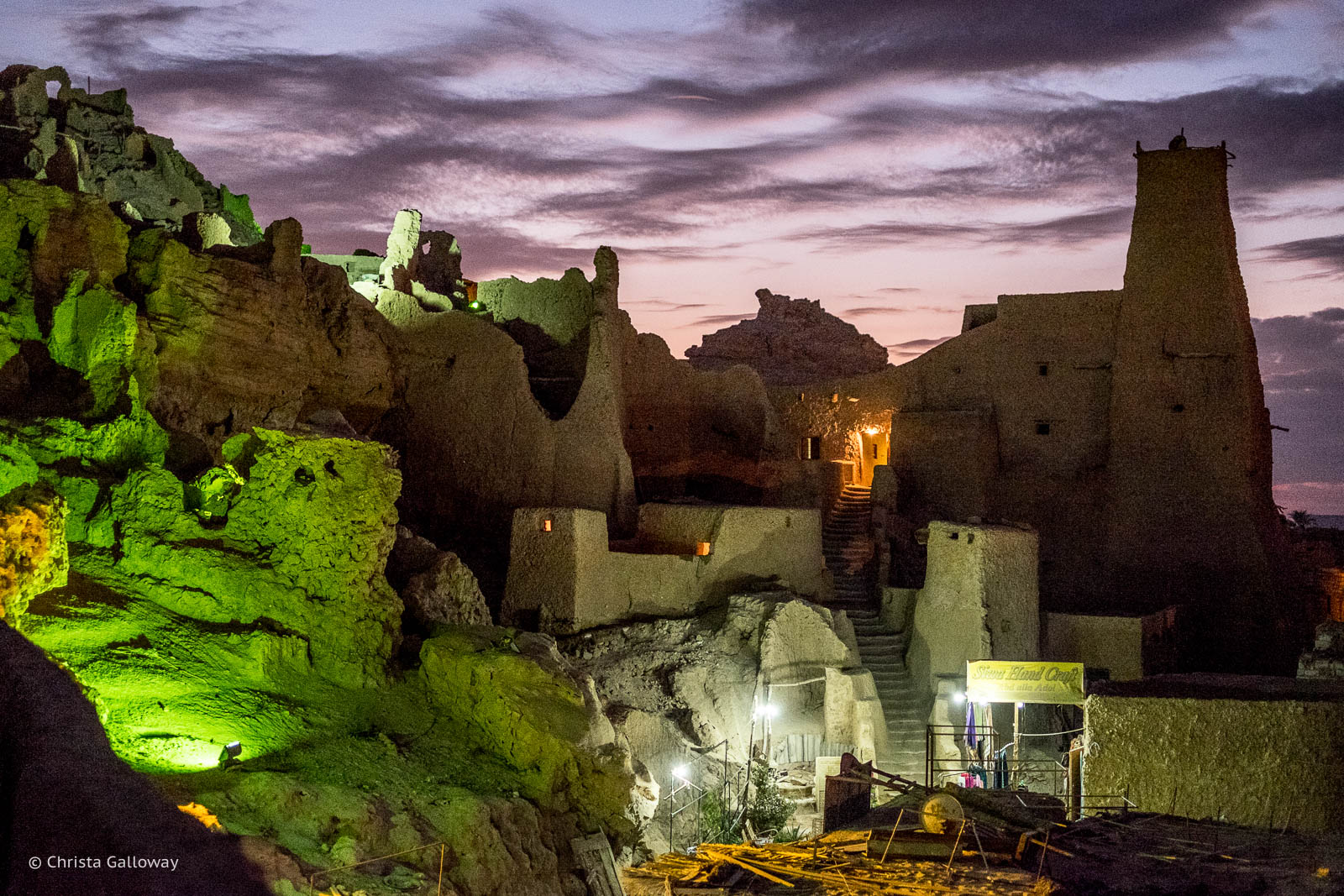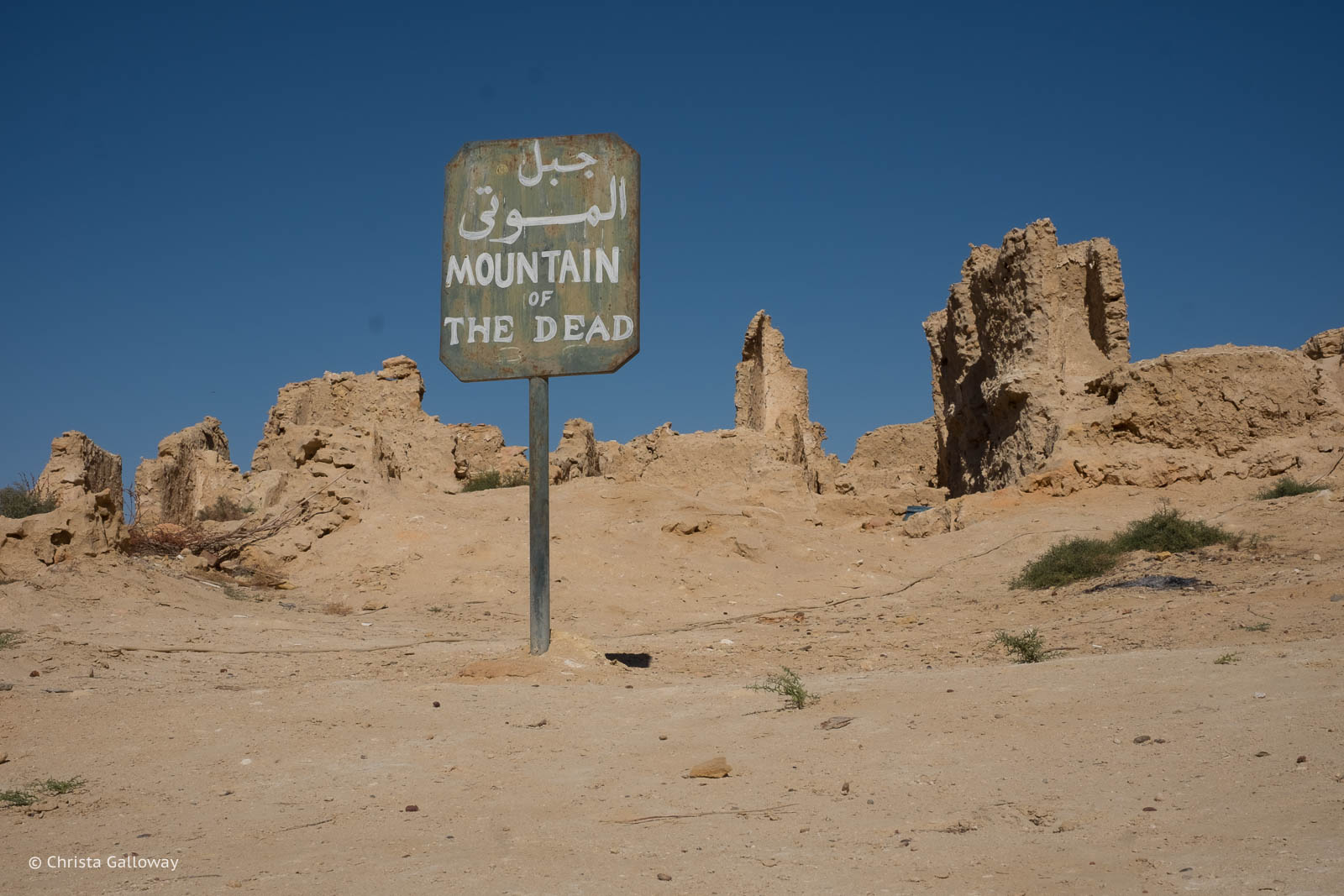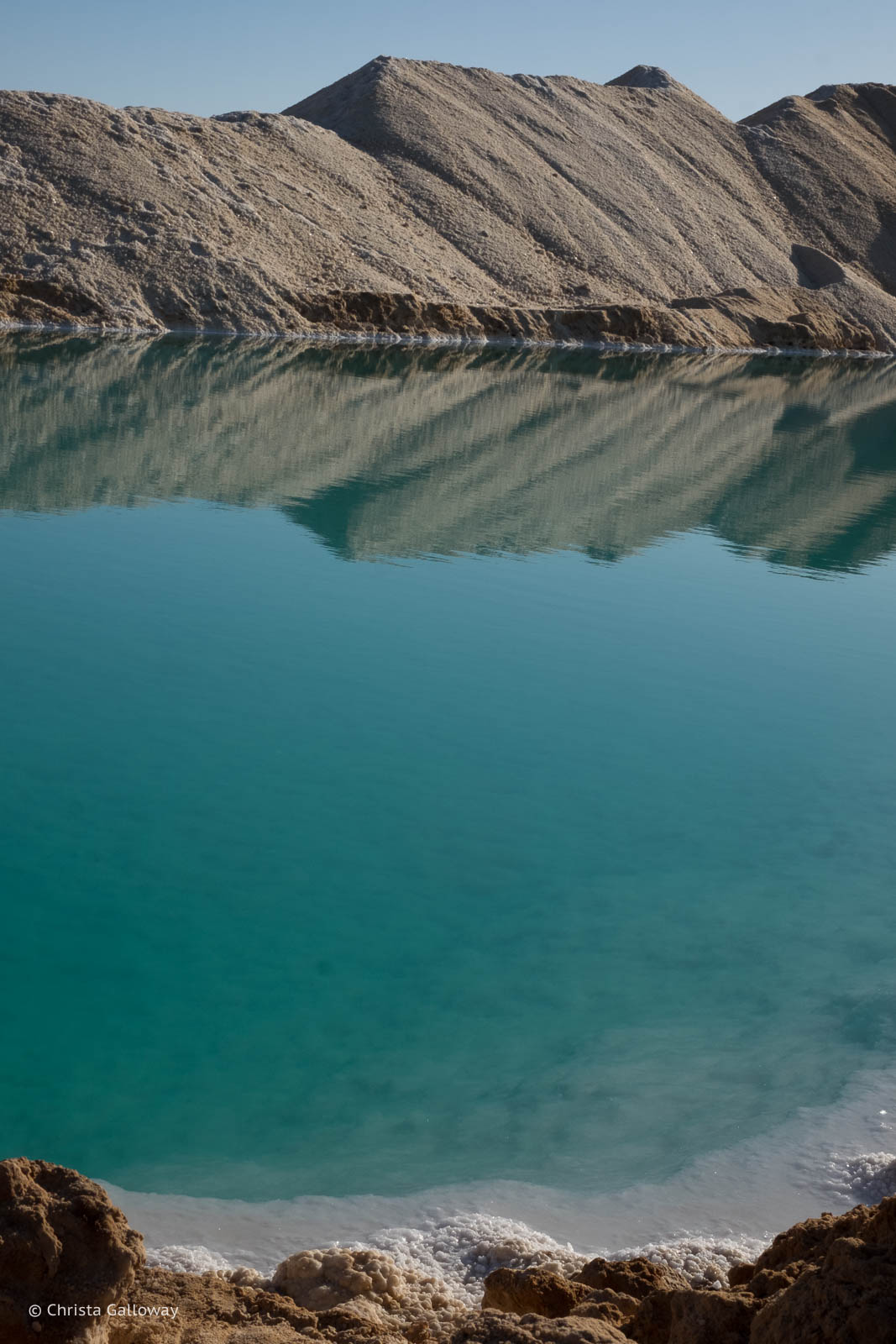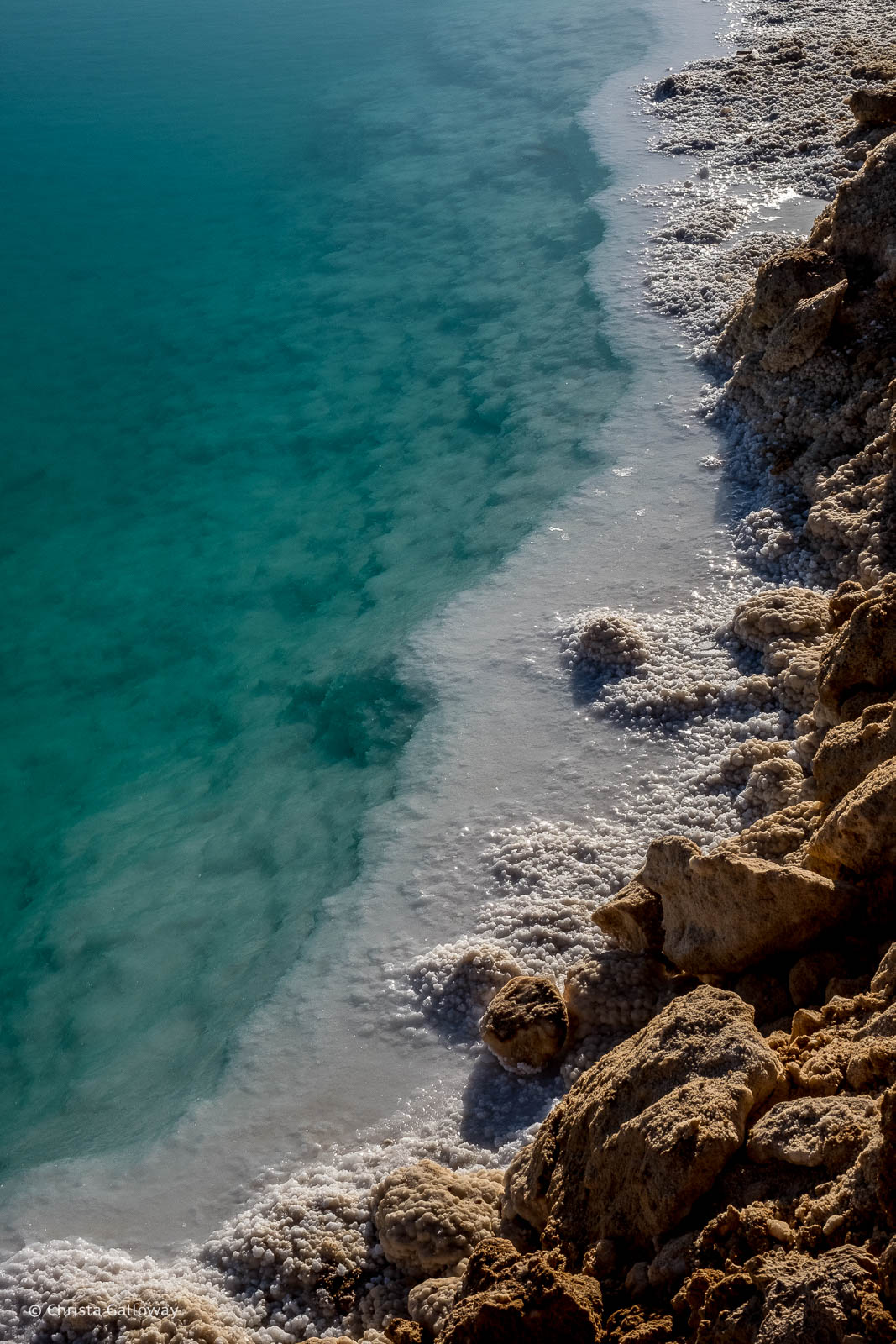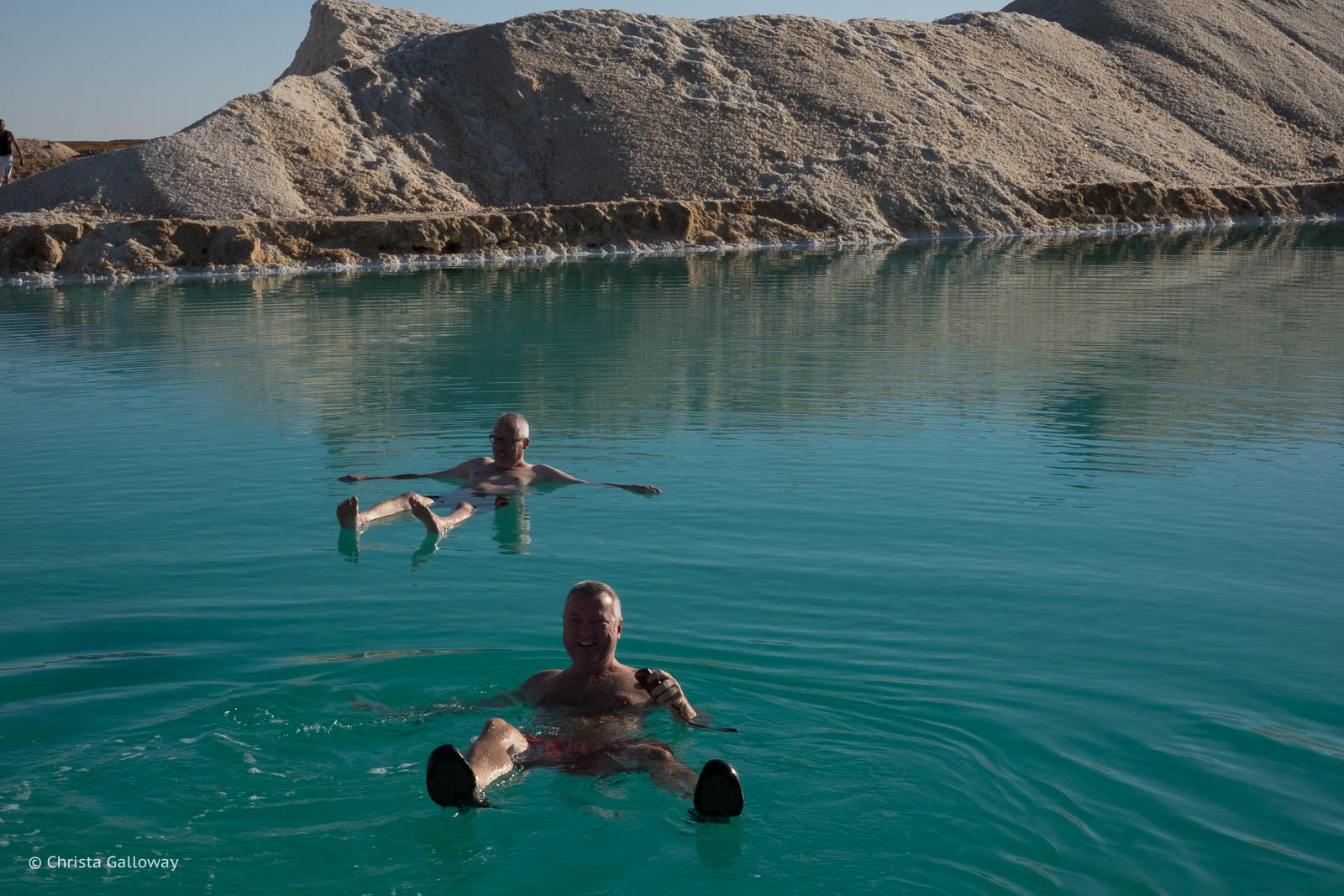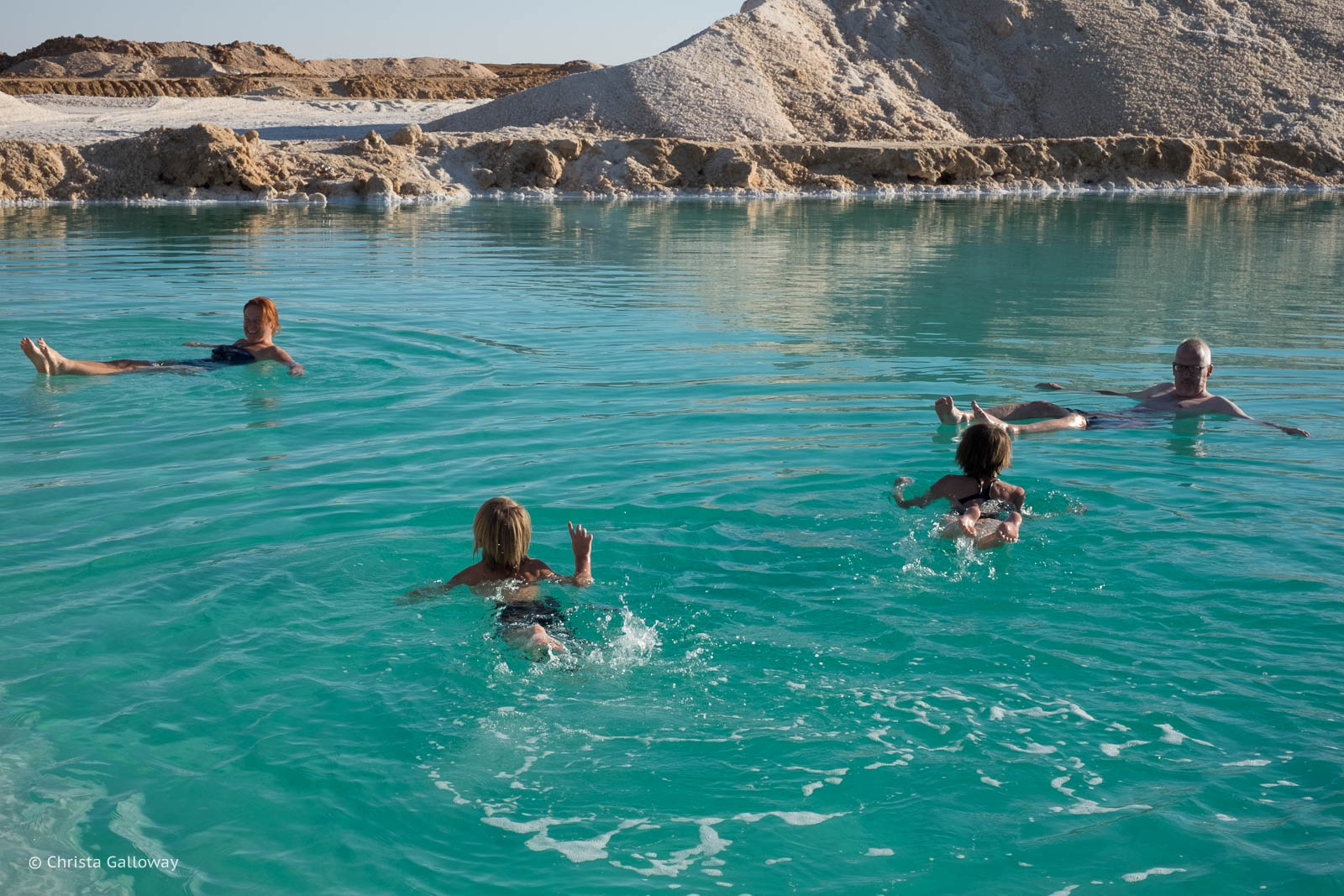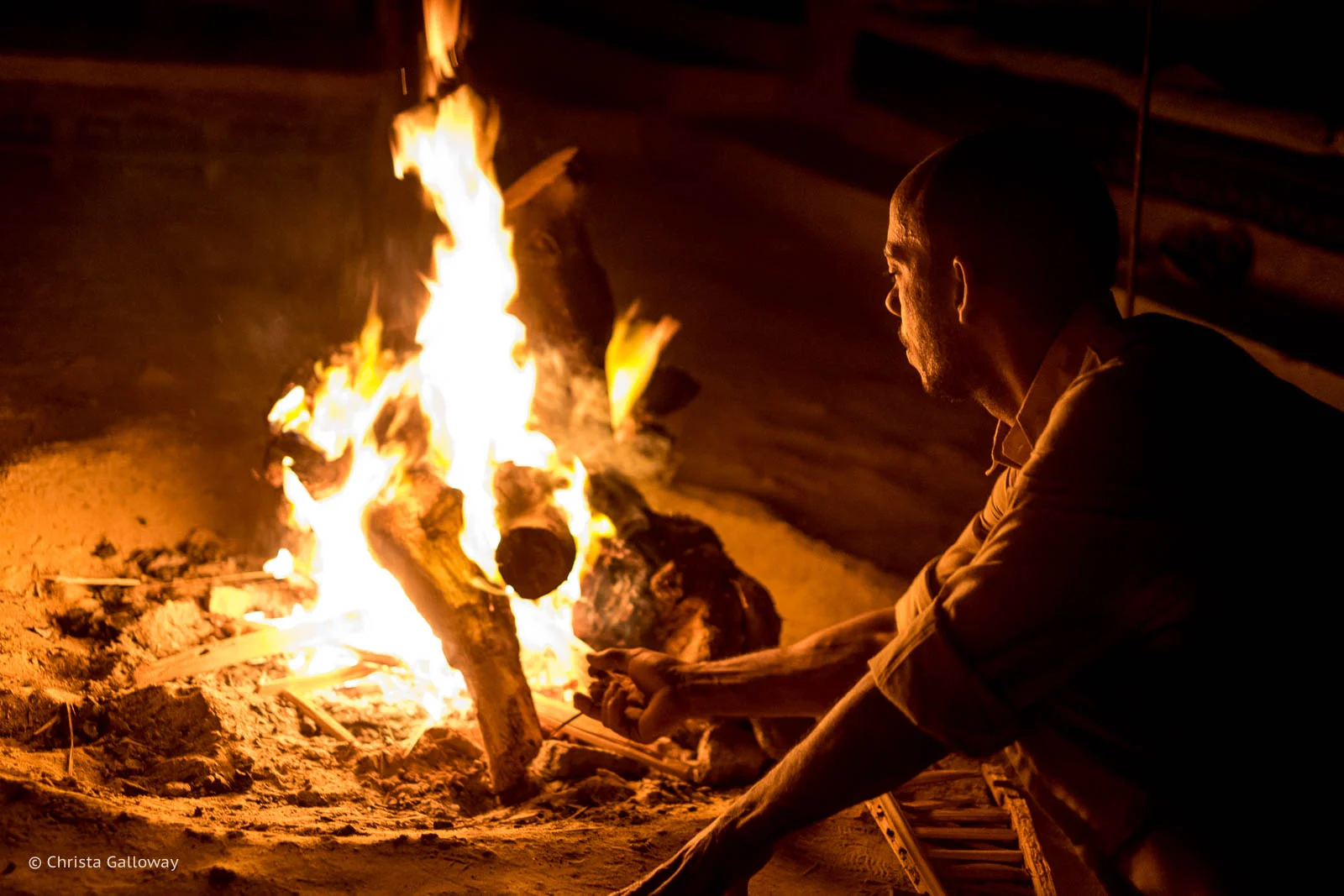We turn away from the coast and cross an invisible line between green and orange. The UK government advises against all but essential travel here. We are about halfway into our seven-hour-drive from Alexandria to Siwa, an oasis in the Sahara Desert. Every so often we are stopped at a checkpoint and our passports are examined by soldier. Turrets with guns overlook us, a trifle menacing, but the soldiers are friendly enough.
The landscape changes subtly as we drive, scrubby bushes getting thinner and scarcer. The desert is a flat rocky floor, stretching until the curve of the earth hides it from view. Near Siwa, a few trees appear, then fields of palm trees. The sand coloured dessert is broken by blue lakes. Closer, we can see the salt that edges the lake like ice.
The Talist Ecolodge and Farm in Siwa, Egypt.
My excitement grows as we turn into our lodge, the Talist Ecolodge and Farm. The colour of the buildings matches the wind-carved sandstone hills behind it. A still pool mirrors the landscape. The tranquility is somewhat marred by the persistence of flies, and we retreat to the screened-in porch.
Oscar exploring the cracks and caves of the sandstone hills behind the Talist Lodge.
Within minutes of our arrival, the kids are all off exploring. Our son, Oscar, and the two children of Lou and Andy, our travelling companions. They find caves, sand hills, and petrified shells from when this desert was a sea bed. They proudly take me on a tour of the caves. I’m told their names, first cave, second cave, third cave and fourth cave. Evidently they are saving their imagination for role-playing games involving dragons and other fantasies. Jemima shows me a magic trick where she disappears into one crack and appears out of another.
Our room at Talist Ecolodge and Farm in Siwa, Egypt.
Our hut is simple but comfortable. There is no electricity so we go to bed soon after nightfall. At night I can hear the wind in the trees and feel the cool breeze on my skin and I’m feel like we are camping.
Breakfast on the second day is felafel and foul, eggs and bread, and a cheese and tomato mixture. Before our afternoon desert tour, we head into Siwa town. There are many men and children, but not many women. The women are at home. The few we do see are fully covered. Their faces are hidden by loose black cloth and they are hooded and draped in more fabric. Their garb is vaguely sinister, reminiscent of the wraiths from Lord of the Rings. My eyes slide off them uneasily, I feel like they don’t want to be seen. It’s hard to imagine that the hidden figures are regular women.
Most of the people we come across are friendly, we are greeted with smiles. "Mumkin soura, low samaht," I ask. Can I take a photo please. Aywa, yes. I'm given a good luck scarab at a shop where I perused without making a purchase. Life is unhurried here, tourists welcome.
We drive through town again on our way to the desert with our tour guide Ibrahim and his son. On our way to the desert, Ibrahim waves at most of the people we pass. Young boys in pairs or groups drive donkey-drawn wagons down the streets. Down an alley we see a small boy hit a smaller girl with a stick. “La! La!” Ibrahim shout out the window. No, No. I think this is a small town where everyone look out for each other, where the adults are parents to all the children.
At the edge of the desert Ibrahim’s son takes some air out of the tires. Soon we are speeding along the sand, revelling in the slip and slide of the vehicle. We go up a steep dune and pause on the the narrow edge. Then we are plunging down, fast. The vehicles fills with gasps, laughs, screams and low exclamations. I laugh, maniacally, a huge grin splitting my face.
We come to a stop and the kids are out, running. They climb a dune and run back down, laughing and falling. I marvel at the smooth wavy line where the sides of sand meet. This is the desert of movies and adventures. I can imagine slow, laborious steps along the peak with the sun beating down, lips cracking and dry mouth craving water. But today it is fun, we run around and expend energy freely. There is water in the vehicle and tea and biscuits for later.
The next stop is for sand boarding. Andy jumps on a board and pushes off. He is always first, says Lou. The guides encourage us to sit on the boards like a sled, but we are mad English people and one mad Canadian. We strap in our feet and sail down the sand like we are snowboarding, or surfing.
I try it only once. I sail down the hill, picking up speed, and bump over car tracks until one finally spills me. I fall into soft sand, unhurt, laughing. The climb up the sandy slope is another matter. The sand slips beneath my feet with each step until I make it to the top, gasping. After that I am content to watch the others play, and photograph the landscape as it changes with the light.
We stop at a hot spring pool on the way back. I would jump in with the others, but there are only men and children in the pool, the woman here are mostly veiled, so I dip my toes in the spring and wander the small oasis.
Back in the 4X4, we crest another steep hill, this time in the dimming light, and then stop and watch the sunset with small glass cups of tea and biscuits. Then it’s back to roads and slow driving and a dinner in the town. Next to our restaurant, crowds of Egyptians spill into the street watching the football match of Egypt versus Morocco. The crowd erupts into cheers and shouts when Egypt scores. I cheer along with them.
The third day we explore Shali, the old part of Siwa. The broken finger of the old town ruins reach up, as if a stone giant is reaching from inside the earth to grasp Siwa. We climb up stairs and winding paths and wonder what it was like when these were rooms and people lived here. Was this a well? Could this have been a dwelling? Now, it is hard to tell.
We walk further into the other side of town. Here, the old ruins are patched up inhabited. There are no women here, no girls. A group of boys hang out on a wagon. “La, la,” they says as I lift my camera. A man sits on a stoop and his eyes follow us as we pass. A few children chase us. “Take, take,” it sounds like one boy shouts. Take a photo? Or is it Arabic? “Ana mish fahma,” I say. I don’t understand.
The homes here edge the street and we walk softly, as if we are treading in people’s backyards. This is not a touristy area. I feel like I don’t belong here. I feel like it’s real. Then the street opens up into souvenir stalls and I am half relieved and half disappointed.
The salt rimmed lake at Siwa, Egypt.
On the fourth morning I wake up with the sunrise and take my camera to the salt shelf of the lake, stalking a patch of still water where the flat-topped hill will be reflected. I find my photo and stop, gazing at the sand and water in the silence. I feel completely at peace and am in no rush to leave. I feel like I’ve found a place with no time. A noisy truck approaches and the spell is broken.
Temple of the Oracle, Siwa, Egypt.
After lunch we leave on another tour. We go to the Temple of the Oracle, a temple where Alexander the Great was told his father was the god Zeus. Next is the Temple of Amun. It looks like a pile of rubble. At some point it was blown up in search of treasure. We elect to just drive past. At the spring of Cleopatra, the men and children jump into the deep circular pool. Lou shops and I take photos. The bathing suit I brought is modest by Canadian standards, but it would be scandalous here. I’m told I will be able to swim ash the next stop, a salt lake.
We drive out into the desert. Jonah and Oscar are deeply involved in a discussion about Plants vs Zombies. They have been inseparable for most of the trip. My eyes are usually glued to the window. We drive beside another large lake and on the other side are salt mines. Empty trucks drive in, and trucks piled high with salt drive out. Every once and a while there is a rectangular pool of water.
“Maybe this is the Salt Lake,” jokes Andy.
It was the Salt Lake.
Andy is in first, of course, and immediately bobs up. The others join him. Two of the children are soon out again, the salt stings their cuts. I pour water over Oscar’s scrapes and jump in once he has recovered. I float effortlessly in the dense, salty water. I could easily have a nap. But today, frolicking is far too much fun. Soon the children are all out, playing in the piles of salt, and the adults bob in the pool. Is this what it is like to float in space?
We discover that while the salt is pleasant in the water, once it dries it becomes progressively more painful. Ibrahim takes us to another hot spring. This one is behind a gate and full of foreigners, so I have no doubts about plunging into the deep hot pool. The stinging salt is washed away and replaced with a soothing warmth as the setting sun casts everything in a warm glow.
Back at the lodge we enjoy another lovely meal. The main dish features the unlikely combination of eggplant and ground beef and raisins. Nevertheless it is delicious. The kids go to bed, exhausted. The adults stay up late, talking about politics and books, drinking wine and rum we brought from home.
The next day we decide to stay and enjoy the Talist Lodge. Oscar and I climb the “mountains” of sandstone, swim in the pool and enjoy leisurely meals. We watch the sun dip low in the cloudless sky. It throws out a blanket of warm light before it disappears, leaving behind a pale pink glow. It is Samhain and the veil between the world of the living and the world of the dead is thin. That night we chat by the fire while the kids make robots out of bottles and mud.
A desert rainstorm north of Siwa.
The drive home is mostly uneventful. Soldiers do the same cursory check of the trunk at each checkpoint. There is a bit of excitement when we pass through a desert storm. The driver slows, uncertain. The storm passes and we are on our way again, careening down the desert road at 140 km/hr, bouncing jauntily. The empty desert is replaced with buildings and light, the silence with cars honking and engines revving, and we know we are back in the city, home.
